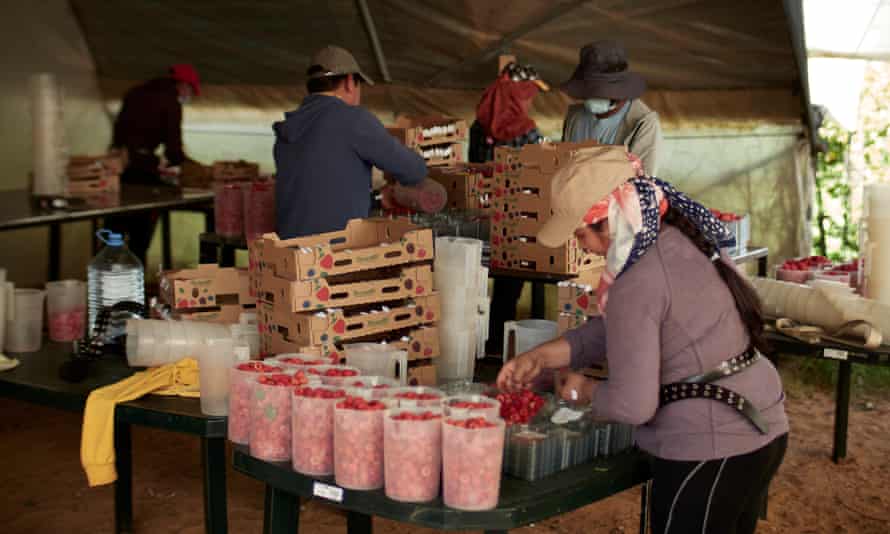Farm workers in Portugal appear to have been illegally working long hours picking berries destined for Marks & Spencer, Tesco and Waitrose for less than minimum wage, according to an investigation by The Guardian.
Speaking anonymously, fearing retaliation from their employers, workers said the hours on their pay stubs were often less than the hours they actually worked.
Workers, mostly from South Asia, are the backbone of Portugal £200m berry industrywhich employs more than 10,000 migrants.
They have been drawn to the country by immigration laws that allow foreigners of all nationalities to gain legal status (and eventually citizenship) through full-time employment and the payment of taxes.
Dreaming of what some jokingly call the “raspberry passport”, many migrant workers fear that changing jobs will invalidate their residency application, despite what they describe as exploitative conditions.
The lack of Portuguese workers in the berry fields is not surprising, said Alberto Matos, who heads the regional office of the immigrant rights organization Solidaridade Imigrante. “No one wants to be a slave in their own country.”
In two visits between September and November 2021, The Guardian spoke to more than 40 men and women from India and Nepal, employed directly or through intermediary agencies, on farms in Odemira, a region in southern Portugal packed with southern restaurants. Asia. and international money transfer services.
Evidence seen by The Guardian suggests that the workers who were underpaid or worked more than the maximum overtime limit were employed by at least three farms that supply their berries to European supermarkets through California-based berry seller Driscoll’s.
The legal minimum wage for agricultural workers in the region in 2021 was €680 (£570) a month, but The Guardian has seen 14 payslips dated from May onwards that appear to show workers earning the general Portuguese national minimum wage. for 2021 of €665 a month.

Lusomorango, a Portuguese organization of soft fruit growers, said there was a possibility that the workers had been paid retroactively since then.
“Before I came here, I thought Portugal was a good job,” said a worker on one of the farms that paid below the legal minimum wage. “I work fast and they don’t give me the money.” Every month, he sends whatever he can afford to her parents in India. “If I do not do it [send money] they don’t eat. That’s the problem for me.”
The Guardian also saw seven pay stubs that appear to show people working beyond the maximum number of overtime hours allowed on the farms that supply Driscoll’s. One employee was working more than 300 hours of overtime a month, according to his payroll, well above the 60 hours a week allowed in Odemira under Portuguese law.
Another worker at a farm that supplies Driscoll’s said his employers fired him in October last year after he refused to work when he had booked time off. Later, he said that he was denied a document that would have allowed him to claim unemployment benefits.
The management of one of the farms that appeared to be paying workers less said its berries end up on the shelves of Waitrose, M&S and Tesco.
Lusomorango said its berry growers, which include at least two of the farms named as being underpaid, or where workers said they worked more overtime than allowed, supply UK supermarkets.
Driscoll’s berries are sold in UK supermarkets for berry gardens.
The long hours and low wages seen on the payroll seem to violate the welfare standards of the workers of Tesco, MS Y Waitroseand your provider Driscoll’s.
Waitrose, Tesco and M&S are members of the Ethical Trading Initiative (ETI), which stipulates that workers must receive wages and benefits that meet national legal standards or industry benchmark standards, whichever is higher.

The TSI base code it also establishes that workers must not work more than 60 hours in a seven-day period, except when permitted by national legislation and freely negotiated collective agreements with workers’ organizations that represent a significant part of the workforce.
Farmworkers interviewed by The Guardian also raised concerns about health and safety on farms.
Three supervisors, each responsible for managing teams of approximately 40 to 75 berry pickers on two farms, stated that they had not received first aid training and did not know how to use the first aid kits on site. Evidence seen by The Guardian suggests that the two farms supply their berries to European supermarkets through Driscoll’s.
Two workers at farms that supply Driscoll’s said they required hospitalization after suffering severe allergic reactions to bee stings, but both reportedly continue to work near dozens of hives. One worker stated that after informing his boss of his condition, he was expected to continue installing the farm’s bee hives despite the risk involved. “I’m scared,” he said. To his knowledge, there were no allergy medications on site, just paracetamol and antiseptics.
Berry Gardens, M&S, Tesco and Waitrose said they were urgently investigating the allegations and would take steps to ensure their standards on worker welfare were met.
A Driscoll’s spokesman said its growers were required to comply with local laws and standards, including wages, overtime and workplace health and safety. They said that “a detailed set of requirements is included in the appendix to the producer’s contract, which specifically addresses requirements for trained personnel, first aid kits and other related topics.”
“If any of our independent growers’ practices conflict with our standards or the local legal framework, Driscoll’s outlines corrective actions that, in severe cases of non-compliance, may lead to termination of the relationship with Driscoll’s.”
The spokesman said all of his growers in Odemira would face a more comprehensive audit at the start of this year’s season. And that he was working with local and national authorities, the government, immigration NGOs and producer associations to provide “secure communication channels to prevent and report abuse and harassment.”
Lusomorango said that it condemns any act contrary to those defined in its code of conduct and the law and that it will continue, through its own and external audit mechanisms, monitoring the activity of its producers and will accompany it with training, awareness and information actions. in order to prevent and correct non-compliance situations.
Sign up for a different view with our Global Dispatch newsletter – a roundup of our top stories from around the world, recommended reading and thoughts from our team on key development and human rights issues, delivered to your inbox every two weeks :
Sign up for Global Dispatch – check your spam folder for confirmation email
www.theguardian.com
George is Digismak’s reported cum editor with 13 years of experience in Journalism